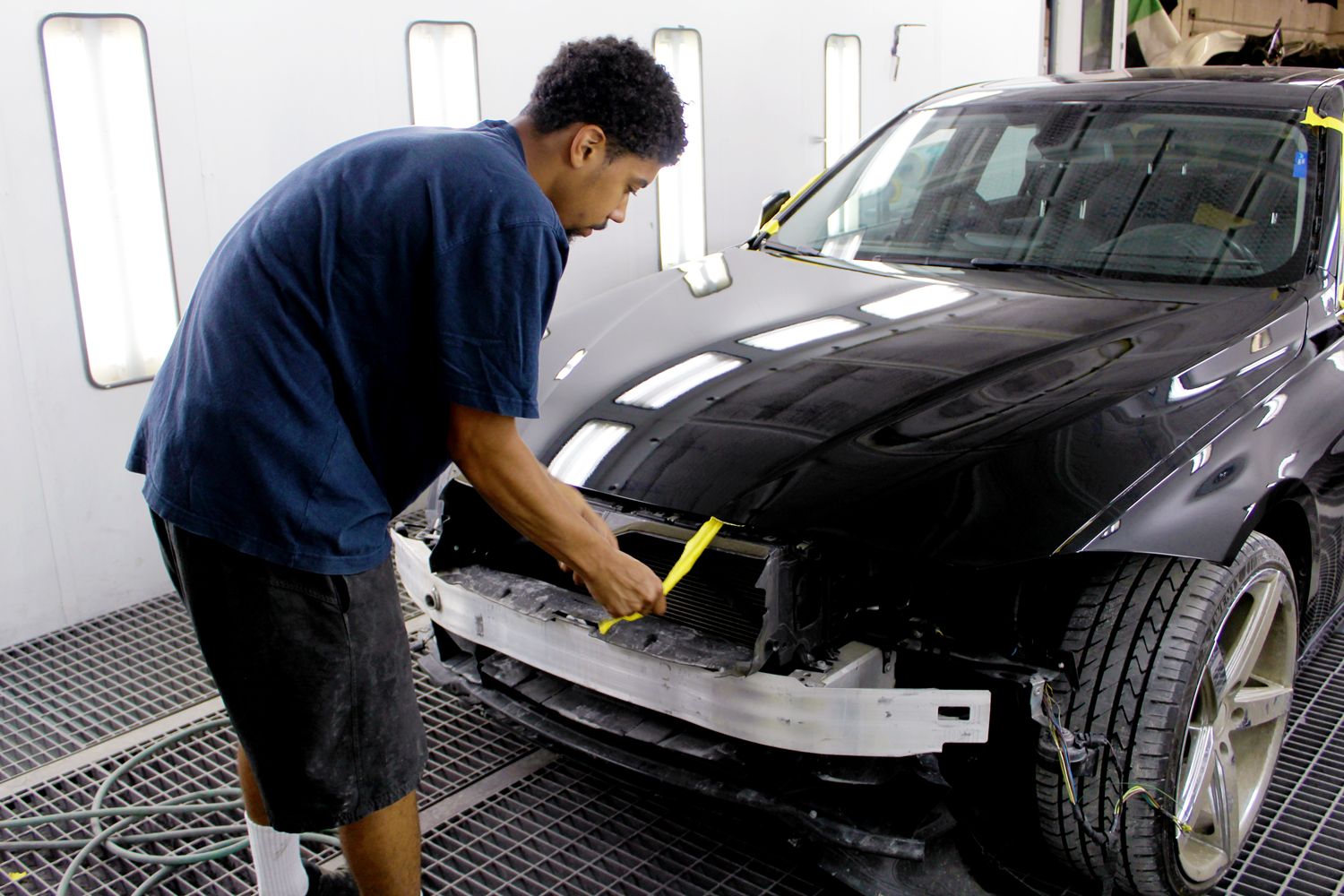A Day in the Life: Body Work Technician Salaries

The world of automotive repair and maintenance is an essential yet often overlooked industry. Body work technicians, or auto body repairers, play a crucial role in keeping vehicles in top shape and ensuring road safety. These skilled professionals dedicate their days to restoring vehicles to their former glory, often working behind the scenes to fix damage that can range from minor dents to severe collision repairs. While their work may not always be in the spotlight, their expertise and craftsmanship are highly valued. In this article, we delve into the world of body work technicians, exploring their daily lives, the challenges they face, and the financial rewards they can expect.
The Art and Science of Body Work

Body work technicians are artists and engineers rolled into one. Their work involves a unique blend of technical precision and creative problem-solving. Every day, they encounter a variety of vehicles, each with its own set of challenges. From classic cars to modern luxury vehicles, no two repair jobs are exactly the same. These professionals must possess an extensive knowledge of vehicle construction, materials science, and painting techniques to successfully restore a vehicle’s appearance and functionality.
The job demands a high level of physical stamina and manual dexterity. Technicians often spend long hours on their feet, performing tasks that require precision and strength. They must be adept at using a range of tools, from basic hammers and mallets to advanced hydraulic equipment and computerized measuring systems. Additionally, they need a keen eye for detail, as even the slightest misalignment or paint imperfection can be noticeable on a restored vehicle.
A Typical Day in the Life
The day of a body work technician begins early. Many shops open their doors before the regular workday to accommodate customers’ busy schedules. Technicians start their day by reviewing the day’s assignments and prioritizing tasks based on urgency and complexity. They then proceed to the shop floor, where they assess the vehicles assigned to them.
For each vehicle, the technician must first diagnose the extent of the damage. This involves a thorough inspection, often requiring the use of specialized tools and equipment. Once the damage is assessed, the technician develops a plan for repair, considering factors such as the vehicle's make and model, the type and severity of damage, and the customer's expectations and budget.
The repair process itself can be intricate and time-consuming. It may involve removing damaged panels, replacing them with new or repaired ones, and then carefully aligning and securing them. Technicians must ensure that all joints and seams are properly sealed to prevent water leakage and corrosion. This step often requires the use of specialized jigs and fixtures to ensure precision.
Once the structural repairs are complete, the vehicle moves on to the painting stage. Technicians must carefully prepare the surface, ensuring it is clean, smooth, and free of any imperfections. This involves sanding, priming, and applying filler to achieve a flawless base. The painting process itself is an art, requiring a steady hand and an understanding of color theory and paint chemistry. Technicians must match the vehicle's original paint color precisely and ensure a smooth, even finish.
After the paint has dried and cured, the final touches are applied. This includes reattaching trim, installing glass, and ensuring all mechanical components are functioning properly. The vehicle is then given a final inspection to ensure it meets the highest standards of safety and aesthetics before being returned to the customer.
Salary Expectations and Industry Trends

Body work technicians’ salaries can vary significantly depending on factors such as experience, geographical location, and the type of shop they work for. Entry-level technicians, especially those with little to no experience, often start with a base salary that may be close to the minimum wage. However, as they gain experience and develop their skills, their earning potential increases significantly.
| Experience Level | Average Salary Range |
|---|---|
| Entry-Level (0-2 years) | $25,000 - $35,000 |
| Experienced (3-5 years) | $35,000 - $50,000 |
| Senior Technicians (6+ years) | $50,000 - $75,000 |

It's important to note that these salary ranges are approximate and can vary based on the technician's skills, certifications, and the demand for their services. For instance, technicians who specialize in rare or luxury vehicle repairs may command higher salaries due to their specialized knowledge and the complexity of the work involved.
The automotive industry as a whole is experiencing a shift towards advanced technologies and computerized systems. As a result, body work technicians are increasingly required to have a strong understanding of vehicle electronics and diagnostic tools. Those who stay up-to-date with these advancements and invest in continuing education can further enhance their earning potential.
Additionally, the industry is seeing a growing demand for eco-friendly and sustainable practices. Technicians who can work with electric and hybrid vehicles, as well as those who adopt green initiatives in their repair processes, may find themselves in higher demand and potentially earn a premium for their services.
The Rewards of the Trade
While the financial rewards are an important aspect of the profession, body work technicians often cite other, more intangible benefits as well. The sense of accomplishment that comes with restoring a severely damaged vehicle to its original condition is a powerful motivator. Technicians take great pride in their work, knowing that their skills and craftsmanship have contributed to ensuring the safety and aesthetics of the vehicle.
The job also offers a high level of variety and creativity. No two days are the same, and each repair presents a unique challenge. Technicians must think on their feet, adapting their techniques and approaches to suit the specific needs of each vehicle. This constant evolution and learning keep the job exciting and engaging.
Furthermore, the automotive industry provides ample opportunities for career growth and specialization. Technicians can choose to focus on specific areas such as classic car restoration, high-performance vehicle repairs, or even specialty services like custom painting and body modifications. This level of specialization not only enhances their expertise but also allows them to command higher salaries and establish themselves as industry leaders.
Conclusion
The world of body work technicians is a fascinating and rewarding one. These professionals dedicate their lives to ensuring the safety and beauty of our vehicles, often working tirelessly behind the scenes. While the job demands a high level of skill and dedication, the financial rewards and intangible benefits make it a highly satisfying career choice. As the automotive industry continues to evolve, body work technicians will remain at the forefront, ensuring that our vehicles not only function properly but also look their best.
What qualifications are needed to become a body work technician?
+To become a body work technician, a combination of formal education and hands-on training is typically required. Many technicians pursue a high school diploma or equivalent, followed by enrollment in a vocational school or community college program that offers courses in automotive body repair. These programs often include classroom instruction and practical training, covering topics such as metalworking, painting techniques, and vehicle diagnostics. Additionally, some employers offer apprenticeship programs, allowing aspiring technicians to gain valuable on-the-job experience under the guidance of experienced professionals.
How long does it take to become proficient as a body work technician?
+Proficiency as a body work technician is a journey that varies from person to person. While formal education programs can provide a solid foundation, it often takes several years of practical experience to truly master the trade. Entry-level technicians typically start by assisting more experienced colleagues, gradually taking on more complex tasks as they gain confidence and skill. On average, it may take around 3-5 years of dedicated practice to become an experienced technician capable of handling a wide range of repair scenarios independently.
What are some common challenges faced by body work technicians?
+Body work technicians encounter a variety of challenges in their daily work. One of the most common challenges is dealing with insurance companies and their specific requirements for repairs. Technicians must navigate complex insurance policies and ensure that their work meets the necessary standards to satisfy both the customer and the insurance provider. Additionally, keeping up with the latest technological advancements in vehicle construction and repair can be a continuous learning curve. From new materials to advanced repair techniques, technicians must stay informed and adapt their skills to meet industry demands.



